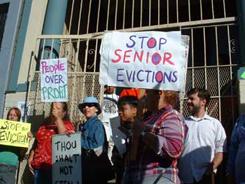
The 56-year-old Pasadena woman at Union Station Foundation's 56-bed shelter said she became homeless in March for the first time in her life.
The woman, who asked that her name not be used, said she moved out of her Inglewood apartment to help her parents relocate to the East Coast. But upon returning, the disabled widow found her small, fixed income could not keep pace with Southern California rents.
She is currently on a waiting list for subsidized housing and is trying to save what money she can.
"I'm tired, I can't wait to get into a place," she said. "Home is so important. You've got to have a home."
Experts say that sparse legislation protecting tenants, high rents, lack of affordable and subsidized housing and a burgeoning senior citizen population suggest a looming crisis.
And the number of homeless seniors in Los Angles County is already on the rise, according to a recent study.
Conducted by Los Angeles-based Shelter Partnership Inc., the study estimated 3,000 to 4,000 people age 62 and older are on the streets throughout the county on any given night.
About one-third of the elderly surveyed in the study had become homeless within 30 days previous to being interviewed.
Lawrence Droughn, director of adult shelter services at Union Station Foundation, added that the 50-plus age group is a rapidly growing element of the facility's clientele.
"We've actually got a growing number of residents 50 years and up," he said.
Shelter officials said the problem has become so pronounced they had to add a new staffer to deal with housing-related issues.
Ruth Schwartz, executive director of Shelter Partnership, said many of the homeless seniors interviewed cited the area's high rents.
"They're retired and many of them have physical ailments so they're not going to go back into the job market," she said. "(A landlord) comes in and raises the rent and they don't have reserves and their monthly income doesn't allow them to take a big bump."
While the state civil code specifies tenants cannot be pushed out as retaliation or for discrimination based on race, age, sexual orientation or other factors, there are no laws protecting tenants on month-to-month leases from arbitrary evictions.
Cities such as Santa Monica, Los Angeles and West Hollywood have rent stabilization ordinances that, along with protecting affected tenants from large rent increases, lay down specific guidelines as to how landlords can evict them.
Pasadena has a mediation ordinance that can force landlords to come to the table in disputes with tenants.
But without such municipal codes, tenants do not have much recourse, said Larry Gross, executive director of the Coalition for Economic Survival.
"This is the plight of tenants where laws don't exist to protect them," he said. "The residents are essentially sitting ducks, they're totally defenseless against rent increases and evictions."
Some fear the aftermath of the ballot initiative, Proposition 98. While the initiative aims to protect property owners from eminent domain for private use, it would wipe out rent control - and the tenant protections that come with it - state-wide.
Greg Harris, executive vice president with the Harris group of Marcus & Millichap, a real estate brokerage firm, said rent control measures are not the answer to housing woes.
Regulating how much a landlord can raise rent, he said, can be detrimental to the overall housing environment.
"I think it's easy when you see what's unfortunately happening to (some) seniors to automatically jump to rent control," he said.
But when apartment owners are faced with increasing costs of operating, rent control can mean buildings aren't kept up as well as they could be, he added.
He said landlords must keep pace with the market and operating expenses but also are conscious of who their tenants are.
"It's a delicate balance," he said. "When you have senior-specific buildings and you know they're on a fixed income, (landlords) intentionally are not aggressive with rent increases because they know seniors don't have the resources."
Scott Ehrlich, partner at Insite Development, said his firm specializes in cutting-edge housing for seniors and added that they try to keep expenses low to keep rents low.
He said the goal for the firm is not to become "filthy rich," but to do a social service while making money.
"We are what you call a developer with a heart, but you can't force that," he said. "People have the right to make money. It's not a legal issue, it's a moral issue."
But Schwartz said if lawmakers don't act, things will only get worse for elders.
"It's under the surface, but it's going to be a huge problem in coming years when the baby boomers become seniors," she said. "It's very scary."
FAIR USE NOTICE. This document may contain copyrighted material the use of which may not have been specifically authorized by the copyright owner. Tenants Together is making this article available on our website in an effort to advance the understanding of tenant rights issues in California. We believe that this constitutes a 'fair use' of any such copyrighted material as provided for in section 107 of the U.S. Copyright Law. If you wish to use this copyrighted material for purposes of your own that go beyond 'fair use,' you must obtain permission from the copyright owner.
